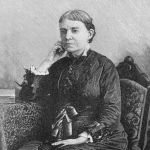Now the rich cherry, whose sleek wood,
And top with silver petals traced
Like a strict box its gems encased,
Has spilt from out that cunning lid,
All in an innocent green round,
Those melting rubies which it hid;
With moss ripe-strawberry-encrusted,
So birds get half, and minds lapse merry
To taste that deep-red, lark’s-bite berry,
And blackcap bloom is yellow-dusted.
The wren that thieved it in the eaves
A trailer of the rose could catch
To her poor droopy sloven thatch,
And side by side with the wren’s brood—
O lovely time of beggar’s luck—
Opens the quaint and hairy bud;
And full and golden is the yield
Of cows that never have to house,
But all night nibble under boughs,
Or cool their sides in the moist field.
Into the rooms flow meadow airs,
The warm farm baking smell’s blown round.
Inside and out, and sky and ground
Are much the same; the wishing star,
Hesperus, kind and early born,
Is risen only finger-far;
All stars stand close in summer air,
And tremble, and look mild as amber;
When wicks are lighted in the chamber,
They are like stars which settled there.
Now straightening from the flowery hay,
Down the still light the mowers look,
Or turn, because their dreaming shook,
And they waked half to other days,
When left alone in the yellow stubble
The rusty-coated mare would graze.
Yet thick the lazy dreams are born,
Another thought can come to mind,
But like the shivering of the wind,
Morning and evening in the corn.



















Comment form: